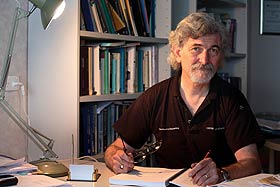
 Professor Rob Lawson:
Professor Rob Lawson:
"New Zealand lags behind most developed countries in adopting energy-efficient behaviours and technologies …"
Although only at the end of its first year, a three-year Energy Cultures project is already gaining international attention.
Professor Rob Lawson (Department of Marketing and convenor of the University's Energy Research Centre) says the project, supported by a $1 million Foundation for Research, Science and Technology grant, aims to understand how people use energy to achieve the lifestyles to which they aspire, and identify barriers to adopting energy-efficient technologies and opportunities to facilitate change.
"New Zealand lags behind most developed countries in adopting energy-efficient behaviours and technologies, and we have been slow to set vigorous standards for energy efficiency in comparison to the rest of the world," says Lawson.
"A lot of behaviour is seen as habitual and difficult to change, even in the face of significant economic pressure. There is a strong inertia to change and preaching austerity certainly does not work. Saving the planet is not a relevant message for many people either."
Since the project launched in October 2009 the multidisciplinary team has had numerous enquiries and collaborative invitations from interested groups from America, UK and Europe.
Working with Mercury Energy and the Energy Efficiency and Conservation Authority (EECA), they have recruited a postdoctoral student from Oxford and potentially opened the way for some of their own PhD students to have a semester at Oxford.
They have also published two papers from their work. The first outlines the theoretical basis for their approach, while the second examines the nature and process of doing interdisciplinary research. This was also the subject of an invited keynote address by three of the team at an international conference at Cambridge in August [2010].
The team has also begun writing up the first stage of data collection. Lawson says that while many energy-related behaviours are habitual and not guided by strong personal values, the findings suggest that by far the greatest reason people act to control energy consumption involves what values literature calls "mastery".
Mastery is the idea of being competent, and being capable and sensible about acting in purposeful ways where you are in control of things. It would appear that this is far more important in guiding people's behaviour regarding energy consumption than, for example, environmental concerns.
"It's a pretty simple finding really, but something that no one has really realised before. So, for example, if you are looking at government promotion of energy saving then it says that's a message to exploit – reassuring people that it's a sensible thing to do and putting them in control of that part of their life."
The team involves staff from Otago's Centre for the Study of Agriculture, Food and Environment, the Departments of Economics, Law (at Waikato University), Marketing and Physics.
Funding
- Foundation for Research, Science and Technology
- Energy Efficiency and Conservation Authority